News & Events
Events
July 14th, 2023 Vertrauen am Arbeitsplatz: Aktuelle Forschung und neue Wege
Vertrauen ist ein wesentliches Element am Arbeitsplatz und hat zentrale Auswirkungen auf Gruppen und Organisationen. Aus diesem Grund ist das Konzept des Vertrauens von großer Bedeutung, sowohl in der Forschung als auch für die Praxis. Am 10. Juli 2023 führte Prof. Kurt Dirks von der University of Washington in St. Louis im Rahmen eines Vortrags an der Goethe Universität die Zuhörenden in den spannenden Bereich des „Vertrauens am Arbeitsplatz“ ein. Kurt Dirks forscht seit vielen Jahren zu den Einflussfaktoren, Grenzen und Folgen von Vertrauen in Organisationen. In seinem Vortrag fasste er die Erkenntnisse aus einem Vierteljahrhundert der Forschung zusammen und zeigte zum Beispiel, dass Vertrauen zwar ein Risiko birgt, aber viele positive Konsequenzen nach sich zieht, wie beispielsweise bessere Leistung, mehr Engagement und geringere Absichten zu kündigen. Insbesondere ging Dirks auf seine neueste Forschung zu kollektivem Vertrauen ein, also die Bereitschaft der Mitarbeitenden, den Personen in einer Organisation insgesamt zu vertrauen. Dabei wurden auch offene Punkte deutlich. Zum Beispiel ist noch nicht ganz klar, wie man solches allgemeine Vertrauen am besten messen kann. In der Diskussion zeigte sich Professor Dirks dabei offen für Impulse des Publikums, auch aus Soziologie und Wirtschaftswissenschaften.
Im Anschluss an den Vortrag konnten die Zuhörenden bei einem geselligen Get-to-gether dem Vortragenden noch Fragen stellen und es fand ein reger Austausch statt.
Das Event wurde vom Center for Leadership and Behavior in Organizations (CLBO) organisiert und von der Karl Schlecht Stiftung gesponsert.
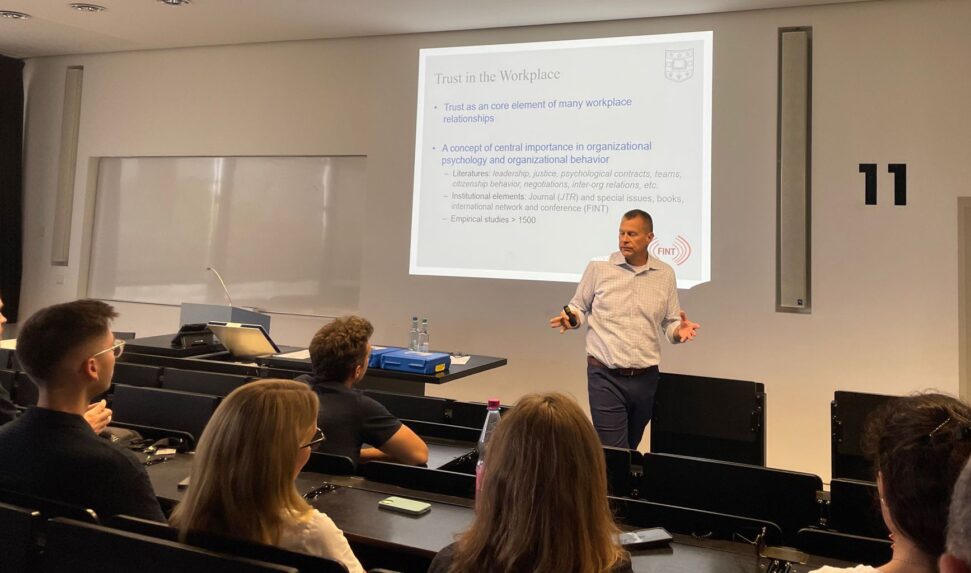
The concept of trust has emerged as a core concept in research in organizational behavior, with important implications for groups and organizations. Prof. Kurt Dirks will summarize the key questions and insights from a quarter-century of research. While considering directions for future research, he will discuss several new studies.
Kurt Dirks is best known for his research on the determinants, barriers, and outcomes of trust within organizations and published several highly cited and award-winning articles on the topic. The research has been covered by popular press such as Business Week, Fortune, New York Times, and the Washington Post. Prior to his current roles, Kurt has served in several leadership positions at the Olin Business School, including Interim Dean, and at the university, including Vice Chancellor of International Affairs.
On July 10, 2023, Prof. Kurt T. Dirks will give a lecture at the Westend Campus. Further information can be found here.
June 8th, 2019 “For a fact-based worldview” – Visit and talk from Mikael Arevius, affiliate of the Gapminder foundation
Part of the lecture series titled “Ist die Welt schlecht? Is the world bad?”
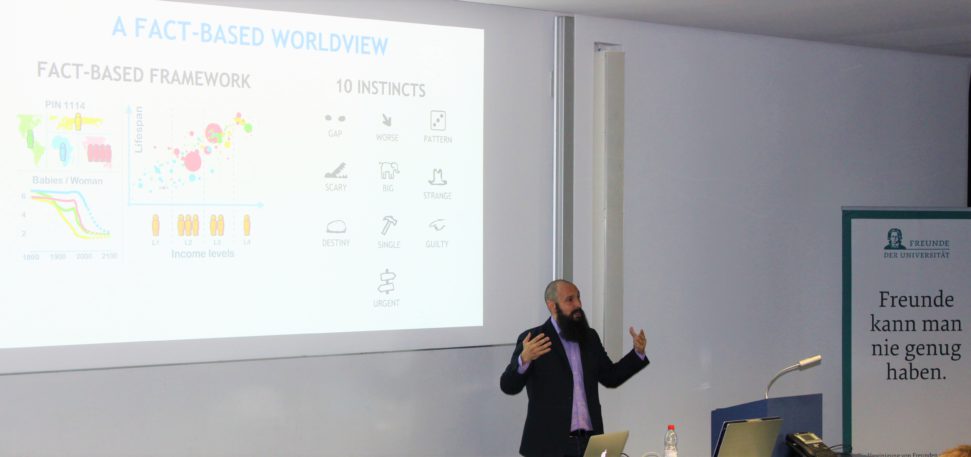
The lecture series titled “Ist die Welt schlecht?” continued with the second seminar carried out by the speaker Mikael Arevius. These lectures, organized by Prof. Rolf van Dick and funded by the association of Goethe University’s friends and supporters and the Grunelius Foundation, tried to provide a deeper insight into the progresses made by humans and into the world’s general condition. Its goal is to challenge the audience to think outside the box and to provide information in order to answer the main question: is the world bad?
Nowadays, we are misled into believing that, despite the technological progresses, the world is still governed by chaos and violence and it might seem that life on planet Earth is not better than it was in previous centuries. However, during his visit at the Goethe University Frankfurt, Mikael Arevius provided data to challenge this idea. Mikael Arevius started his career as a school teacher in Sweden. Subsequently, he expanded his knowledge in different areas, such as education and leadership. His experience and his inclination to create teaching tools and materials led him to collaborate with Gapminder. Gapminder is a Swedish foundation created by Hans Rosling, which provides statistical data from all over the globe. Gapminder, on the basis that there is a subtle ignorance regarding the facts of the world, aims to promote a greater awareness about global data, which are not always looked from the correct perspective.
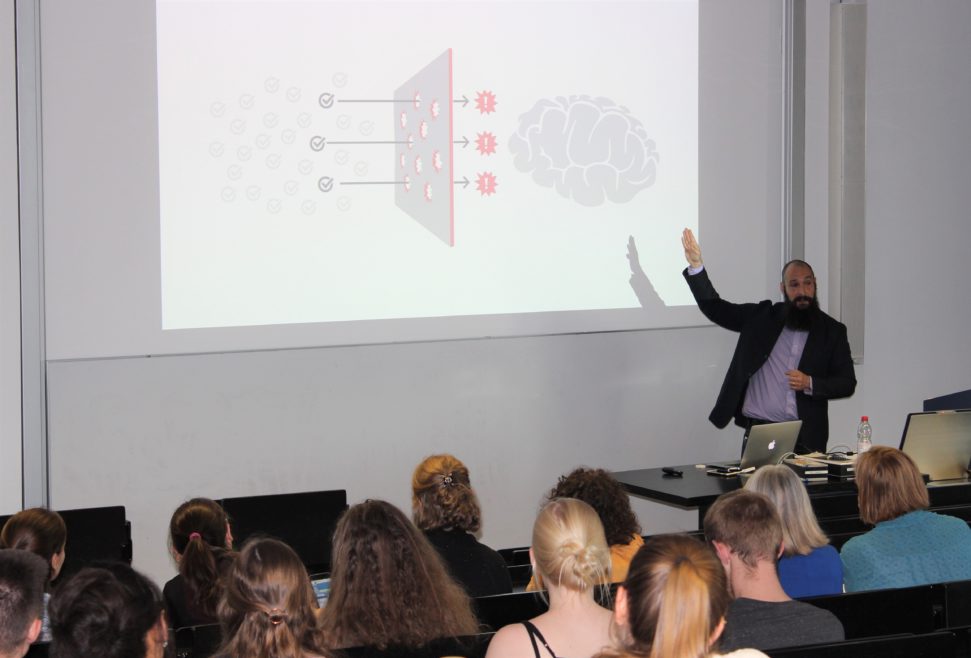
In the course of the lecture series “Is the world bad?”, Mikael Arevius visited the Goethe University Frankfurt. Besides a small group meeting, he gave a talk “For a fact-based worldview”. This lecture was interactive, indeed, the audience was asked to actively participate in the talk by answering a survey of four questions at the beginning of the lecture. The four questions were related to global facts and the total score of the audience was used by the speaker later in the talk to argument his ideas. After taking part in the survey, Mikael Arevius started the discussion highlighting how poorly people, normally, score in questionnaires like the one done at the beginning of the talk. In fact, people answering a 12-items questionnaire generally score less than 33%, which is, statistically speaking, the minimum percentage of correct responses if the answers were chosen randomly. The fact that people score less than 33% suggests that there is a shared ignorance regarding facts about the world.
Many examples were used to show to the audience the existence of a subtle ignorance about global facts. Furthermore, one striking illustration of the importance to look at trends and not just at the latest data was regarding the presence of women in politics. Nowadays, the percentage of women in political settings is about 23%, which is not a high percentage. However, Mikael Arevius showed that, compared to previous years, there was a significant growth of women in politics. The talk continued by showing interesting data about the general evolution of the world and its population. Remarkable was the use of teaching tools. Indeed, Mikael showed different animated bubble charts that aided the understanding and interpretation of statistical data. His material can also be found online, and it is free to the public.
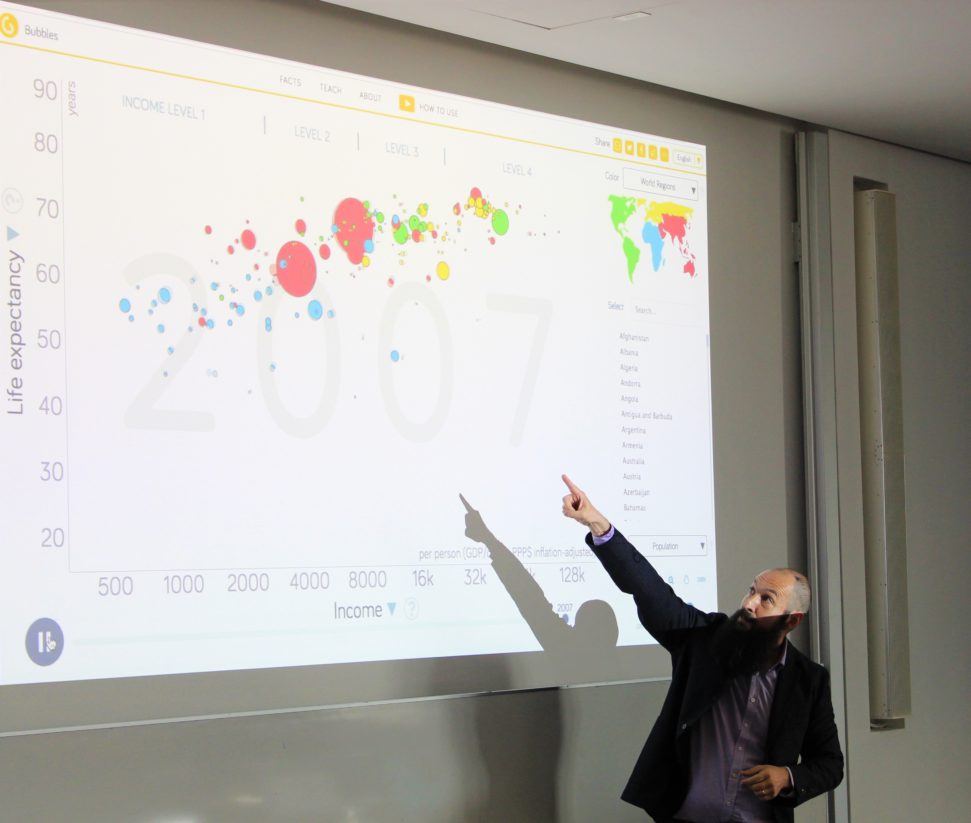
In conclusion, the talk by Mikael Arevius was very inspiring and gave a new insight into global data and their interpretation. His visit was part of a series of lectures on the future, which was donated by the association of friends and supporters of Goethe University to celebrate their 100-year anniversary and funded by the Grunelius foundation. Thus, this special gift to the university and the citizens of the city offered a wonderful opportunity to take a different look at the world.
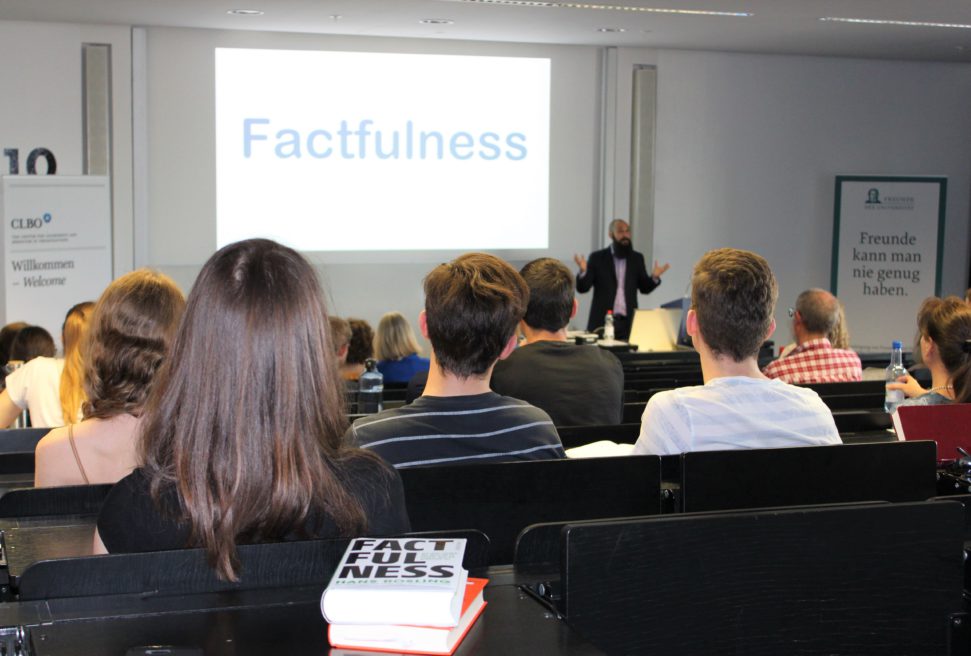
Start of the lecture series “Ist die Welt schlecht? Is the world bad?”
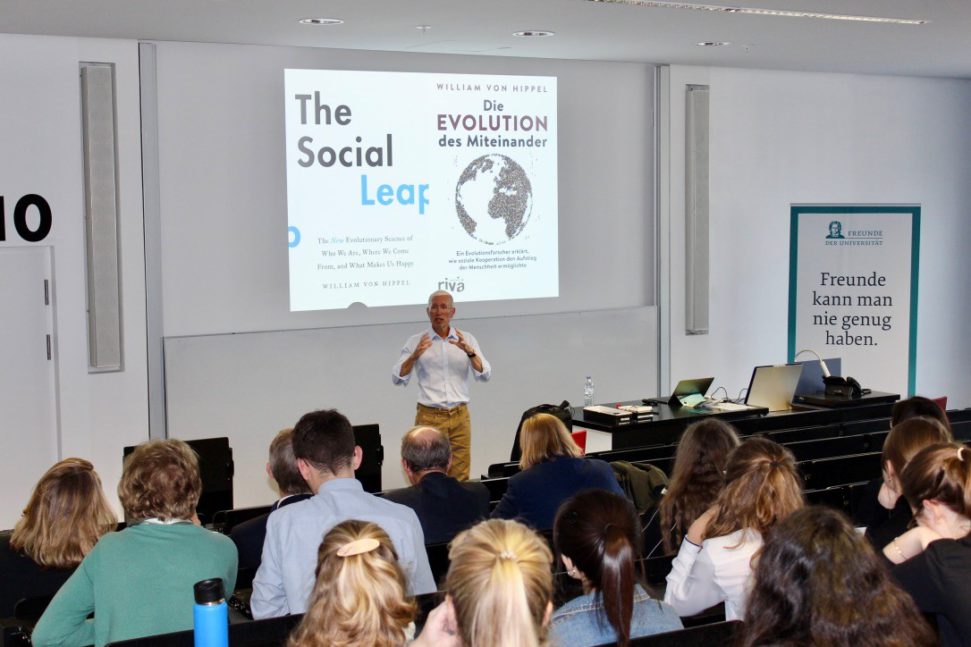
„Is the world bad?“ is the main question within the lecture series organized by Prof. Rolf van Dick with the contribution of friends and supporters of Goethe University and funded by the Grunelius Foundation. When we watch the news, read the newspaper or screen the social media, we are confronted with disasters, crises and terrorism. And this can easily lead to the impression that the world is getting worse and worse and that everything was better in the past. However, a lot has changed to the better over the past years. The aim of this lecture series is to put things into perspective and to look at the positive side and at the advancements that we have made in the past years.
The start of the lecture series was made by Prof. William von Hippel, who visited the Goethe University from May 20th to 22nd. During his permanence in Frankfurt, he gave a talk about „The social leap“, from which he offered some ideas to answer the important question: „ Is the world bad?“. Prof. William von Hippel received his PhD in social psychology at the University of Michigan. He then was an assistant and associate professorship at Ohio State University. Currently, he is Professor of Psychology at the University of Queensland in Brisbane, Australia. His research interests include evolutionary psychology, executive functioning and social competences.
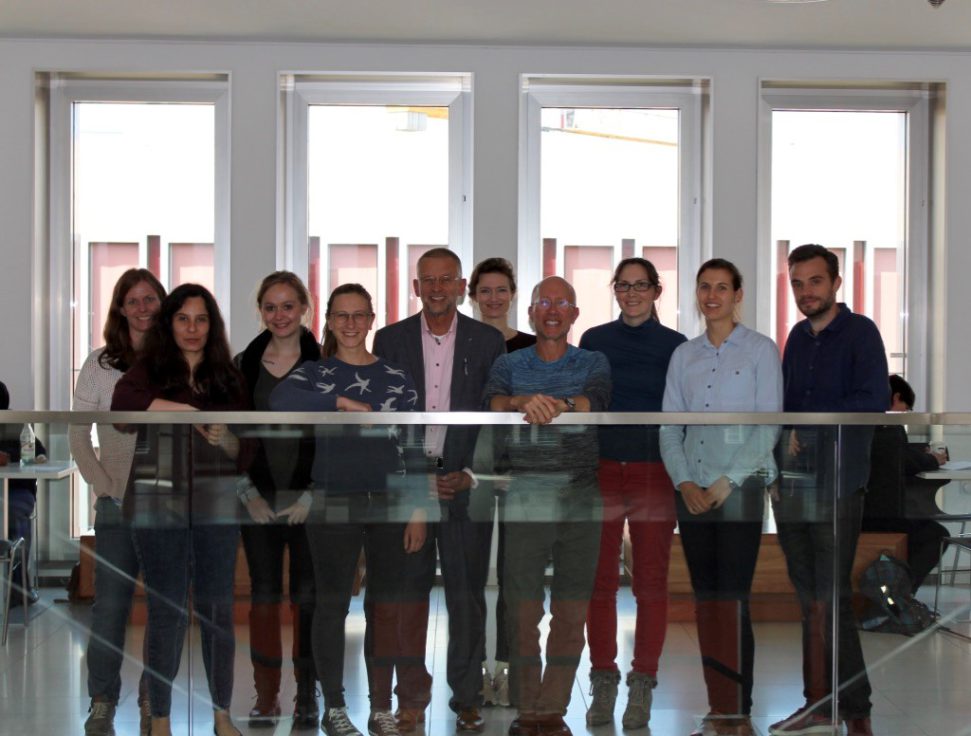
During his stay, Prof. William von Hippel met up with PhD students, postdocs and professors from different departments of the Goethe University. For example, he discussed research questions with members of the Department of Psychology, had meetings with members of the Faculty of Economics and Business Administration and exchanged ideas with members of the Department of Management and Microeconomics. Besides personal meetings, several small group meetings took place like a stimulating discussion with the interdisciplinary collaborative network “Resilience Factors in a diachronic and intercultural perspective” where researchers from archaeology, psychology and life sciences examine which factors enable individuals, smaller or larger collectives to cope with stressful situation in the past.
The highlight of his visit at the Goethe University was his talk about “The social leap”. He began his talk from the evolution of our distant ancestors that encouraged a “social leap” from the rainforest to the savannah. Indeed, they prioritized teamwork over physical competences in their struggle for survival, creating a new form of social intelligence that shaped humanity’s way from the apex predator. He then built a bridge between our evolutionary history over the last 6 million years and some of the fundamental aspects of our lives today. For example, he highlighted how cooperation and kindness make us more effective killers, indicating that this can be seen both as a threat and as an opportunity. In addition, he theorized how for example with the aid of modern medicine and knowledge about the environment, the world got cleaner and safer and people became healthier and older. He concluded his inspiring talk with possible explanations about the reasons why people are not so much happier even though the world has progressively become better.
Altogether, it was an interesting and inspiring visit and a great start for the lecture series which was made possible by the association of Goethe University’s friends and supporters and the Grunelius Foundation who supported this lecture series - without their financial support this event would not have been possible. Many contacts were made and collaborations were planned for further projects. Prof. William von Hippel concluded that he had enjoyed his stay in Frankfurt very much and that he would like to come back during his sabbatical next year.
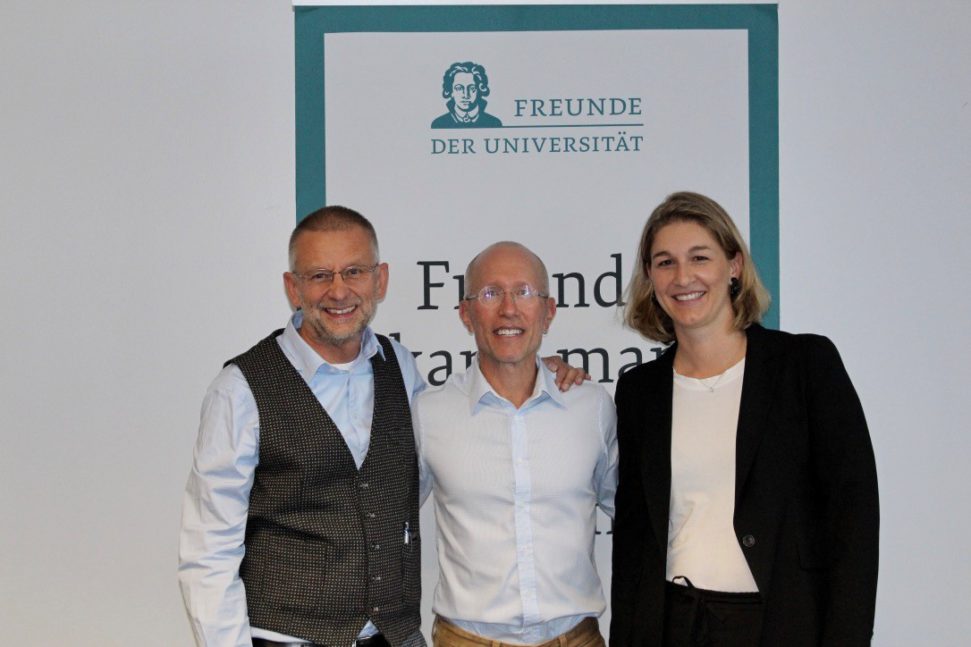
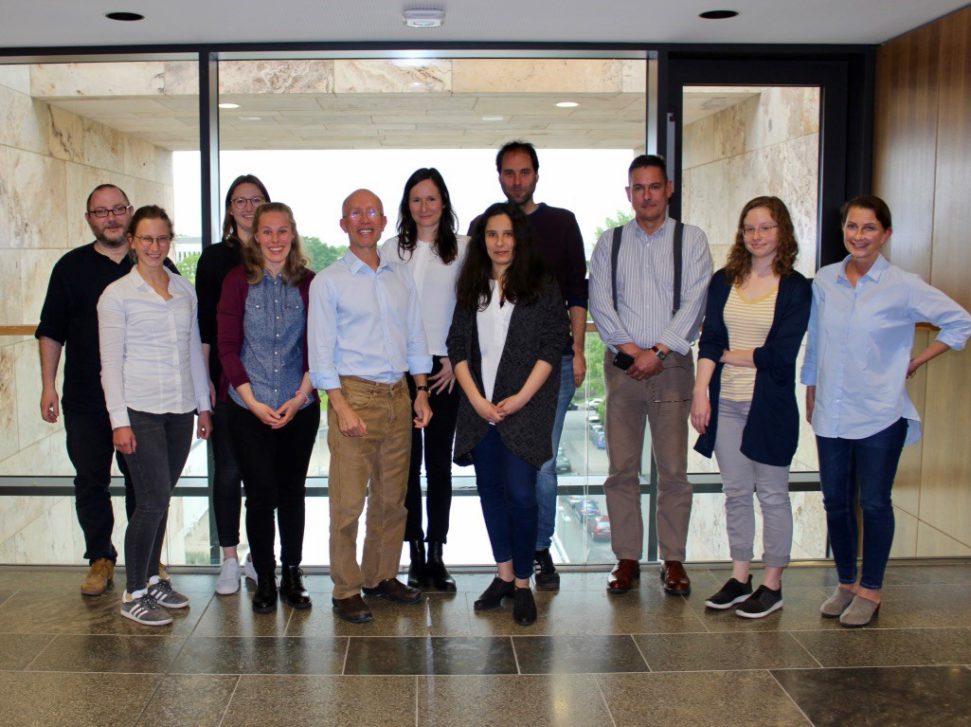
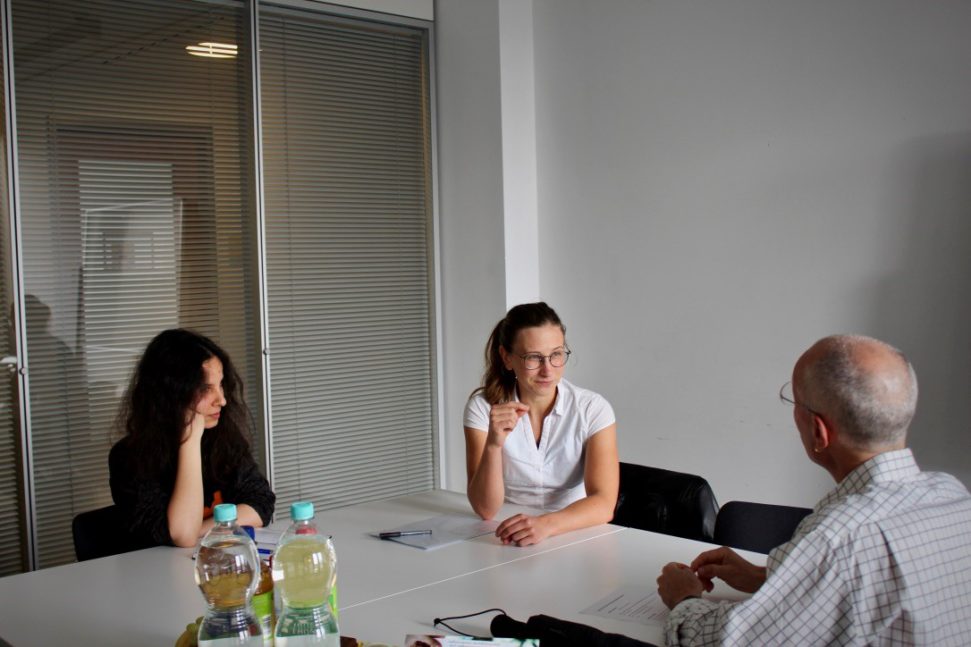
May 1st, 2019 Vortragsreihe „Ist die Welt schlecht?“
Katastrophen, Krisen, Unfälle und Terrorismus – schlägt man die Zeitung auf, schaut Nachrichten oder surft im Internet und in den „sozialen Medien”, könnte man den Eindruck bekommen, dass wir heute in einer schlechten Welt leben und dass alles immer schlimmer wird. Über negative Ereignisse zu berichten ist eine wichtige Aufgabe der Medien. Aber ist die Welt wirklich voll von Problemen, Bedrohungen und Ungleichheit? In den vergangenen Jahren hat eine Reihe von Wissenschaftlerinnen und Wissenschaftlern ganz unterschiedlicher Disziplinen sich dieser Frage gewidmet. Sie alle zeigen: Der Menschheit insgesamt geht es in ihrer über zwei Millionen Jahre alten Entwicklungsgeschichte so gut wie nie zuvor. Wir leben also gesünder, länger, friedlicher und wohlhabender als je zuvor, haben aber den Eindruck, dass alles immer schlimmer wird. Wie kommt es zu diesen verzerrten Wahrnehmungen? Wie sieht die Faktenlage tatsächlich aus? Diesen und weiteren Fragen widmet sich die Vortragsreihe. Im Rahmen von zwei Gastvorträgen laden wir Sie ein, sich mit den globalen Entwicklungen der letzten Jahrhunderte auseinanderzusetzen und gemeinsam mit uns die Fakten und Mythen zu entdecken und zu diskutieren. Im Rahmen dieser Vortragsreihe wird Prof. William von Hippel am 21.05.2019 einen Vortrag zum Thema „The social leap“ halten. Am 04.06.2019 wird Mikael Arevius von der Gapminder Foundation einen Vortrag zum Thema „For a fact-based worldview“ halten. Die Vorträge finden jeweils um 18:30 Uhr im Hörsaal 10 im Hörsaalzentrum auf dem Campus Westend der Goethe Universität Frankfurt statt. Weitere Informationen zu der Vortragsreihe und den Vorträgen finden Sie hier.
March 9th, 2017 (Deutsch) Lunchtalk “Strengthening Women Career Networks – A Transatlantic Exchange of Best Practices“
Sorry, this entry is only available in Deutsch.
